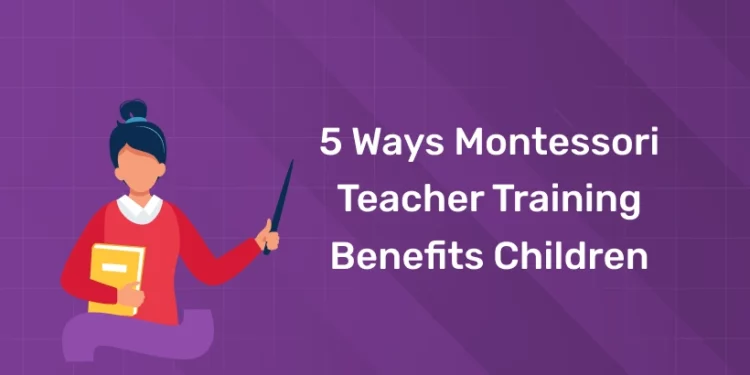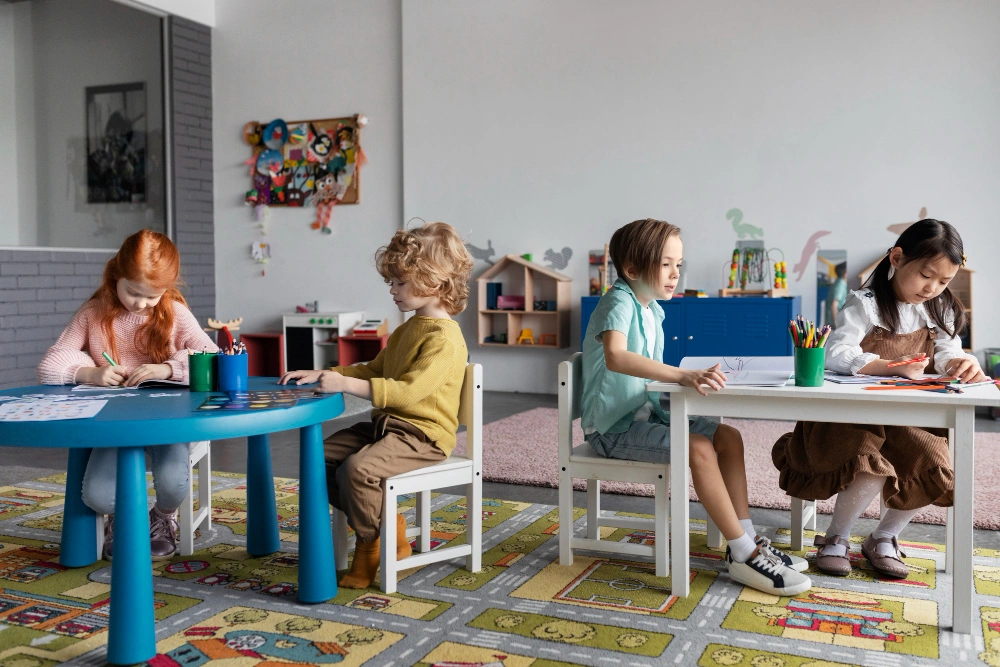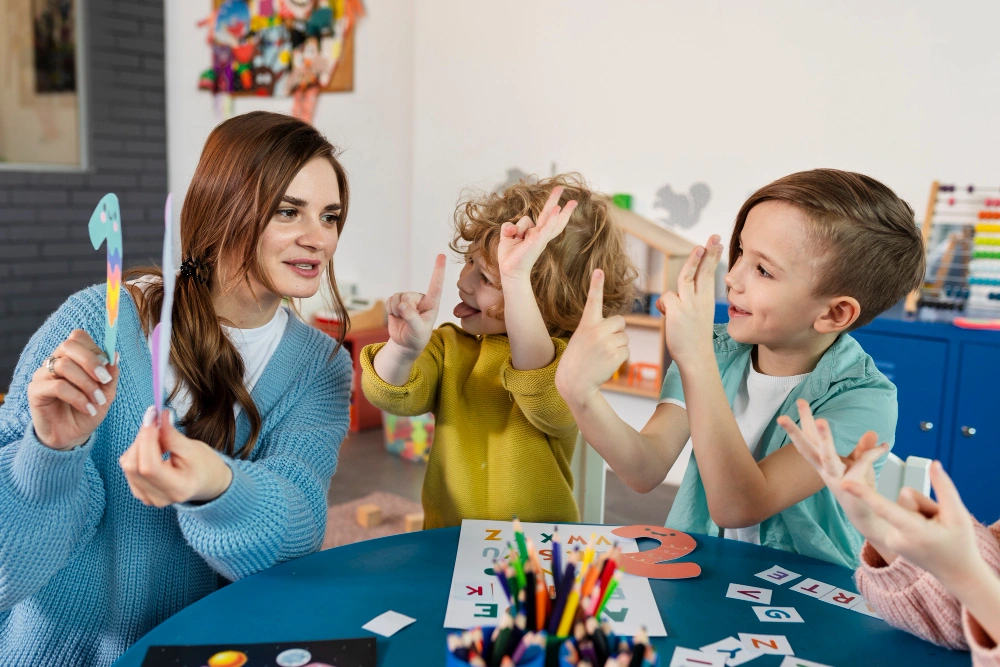Table of Contents
Key Takeaways:
- Montessori teacher training empowers educators to nurture independence, creativity, emotional intelligence, and a love for lifelong learning.
- Training equips teachers with observation skills, personalized lesson planning, and use of hands-on materials.
- The child benefits directly by becoming confident, empathetic, adaptable, and intellectually curious.
- In India, Montessori training has specific relevance given the growing demand for quality preschool education.
- Entri Montessori Course provides Indian teachers a flexible and practical route to gain globally recognized skills and enhance employability.
- Parents, too, can look for classrooms led by Montessori-trained teachers to ensure their children grow in nurturing environments.
The toddler years are the most critical, planting the seeds for their emotional, social, and intellectual development. As a result, the education they receive during this time leaves an imprint on their future. Montessori education, practiced for over 100 years now, is arguably the most effective and popular approach to early childhood learning.
But what’s so powerful about Montessori? The secret isn’t just the curriculum; it’s how the teachers are trained to create a culture that nurtures independence and self-regulation, and passion for learning. Montessori teacher training provides educators with the resources and mindset to foster children’s development in a very holistic way.
In this blog post, we’ll discuss 5 key advantages Montessori teacher training provides children. Then we’ll see how registering for the Entri Montessori Course can give teachers the skills to apply these transformative methods.
Unlock your passion for education and shape young minds as a Montessori teacher!
The Essence of Montessori Teacher Training
Before we unpack the benefits, it’s important to understand what Montessori teacher training actually entails. While traditional teacher training emphasizes classroom control, syllabus completion, and discipline, Montessori training redefines the role of the teacher. It equips educators to:
-
Observe instead of dictating.
-
Prepare environments that are structured yet flexible.
-
Introduce materials designed for hands-on learning.
-
Encourage independent decision-making among children.
-
Serve as guides rather than instructors.
This specialized training ensures teachers not only understand child psychology but also practice the patience, adaptability, and empathy needed to allow holistic development.
1. Strengthening Independence and Confidence
Independence is at the heart of Montessori. A Montessori trained teacher knows that children from a very young age can do self-directed work. Instead of constantly correcting or doing the work for them, a Montessori trained teacher creates opportunities for children to feel responsible for their learning.
For example:
- In a Montessori classroom children set up their own learning materials, arrange their space and tidy up afterwards.
- Montessori teachers encourage decision making: whether it’s choosing blocks, art materials or puzzles children feel in control.
How training helps:
Without Montessori teacher training, educators may unintentionally overguide or make children dependent. Training ensures teachers get the balance right – providing support where needed and stepping back when independence is emerging.
Benefits to children:
- Builds self-confidence from an early age.
- Improves problem-solving skills.
- Encourages accountability and pride in their work.
2. Encouraging Cognitive and Creative Development
Children are curious. Traditional systems often interrupt this curiosity with rigid structures and limit exploration. Montessori-trained teachers know how to use curiosity as fuel for learning.
In practice:
- Teachers introduce real-world tools (measuring spoons, beads, maps) instead of abstract memorization.
- They use sensory materials – touch, smell, visuals – to make learning more immersive.
- Lessons are not imposed; they emerge from the child’s interest.
Why training matters:
Montessori teacher training gives educators knowledge of unique teaching aids and creative methodologies. Without prior training a teacher may not know how to unlock this side of a child’s brain.
Benefits to children:
- Deepens intellectual engagement and memory retention.
- Sparks creativity, imagination, and innovation.
- Supports both left brain (logical) and right brain (creative) development.
3. Emotional and Social Intelligence
Academic intelligence is incomplete without emotional awareness. Montessori classrooms give equal importance to empathy, friendships, and community living.
Training:
Montessori-trained teachers master observation techniques to read emotional cues. Instead of punishing the behavior, they address the root cause – whether it’s anxiety, restlessness, or lack of confidence.
In the classroom:
- Children are encouraged to work together, share tools, and respect each other’s space.
- Teachers mediate conflicts by guiding children to resolve them peacefully instead of commanding silence.
- Teachers model respect in tone and language, which children mirror.
Benefits to children:
- Builds empathy, respect, and cooperation.
- Reduces aggression and behavioral issues.
- Prepares children to handle different emotions with resilience.
4. Lifelong Love for Learning
One of the most striking outcomes of Montessori training is how teachers instill a genuine love for learning. Children don’t see education as a burden but as an adventure.
Trained teachers know how to:
- Introduce subjects as interconnected parts of life, not isolated subjects. For example, math concepts are shown through beads, linking directly to tangible experiences.
- Use nature walks, hands-on experiments, and storytelling to generate excitement.
- Encourage children to ask questions instead of just absorbing data.
Benefits to children:
- Builds intrinsic motivation, not learning for grades.
- Reduces fear of failure because exploration is valued as much as the end result.
- Fosters adaptability, the child becomes open to new ideas and disciplines throughout life.
5. Personalized Education for Every Child
One of the flaws of traditional classrooms is treating all children the same. Montessori-trained teachers see each child as unique in pace, interest, and learning style.
Training tools:
- Teachers learn to tailor activities based on individual observation.
- They identify whether a child is kinesthetic (learns by doing), auditory, or visual and adapt teaching methods accordingly.
- Teachers learn to be patient with mixed-age classrooms where older children support younger peers.
Benefits to children:
- Struggling learners get the attention they need without shame.
- Advanced learners aren’t held back by rigid curriculum timelines.
- Every child feels seen, heard, and valued.
Why Montessori Teacher Training Matters in India
1: What is the primary focus of the first plane of development in the Montessori method?
India’s preschool sector is expanding rapidly. Parents today are not satisfied with rote learning or classrooms where discipline masks curiosity. They seek nurturing environments where their children develop life skills alongside academics. Schools are therefore looking for teachers equipped with Montessori training because:
-
Montessori pedagogy aligns with global early childhood standards.
-
Indian parents increasingly value holistic development, not just memorization.
-
Today’s classrooms often include children from diverse backgrounds—Montessori’s emphasis on empathy and independence works universally.
Entri’s Montessori Course is one of the accessible routes for aspiring teachers in India. Designed with flexibility, it allows working professionals and fresh graduates to upskill at their own pace. By covering observation methods, activity planning, and classroom case studies, this course gives Indian nursery and preschool teachers practical tools they can apply immediately in classrooms. Many resume shortlists today explicitly prefer candidates with Montessori certifications, which shows how beneficial it is to complete such training.
Enroll in the Montessori Teachers Training Course! Get a free Demo Here!
Get Certified & Start Your Montessori Career
Montessori Teacher Training Course by Entri App: Gain expert skills, earn certification, and kickstart your teaching career.
Join Now!Tips for Parents: Identifying Montessori-Trained Teachers
Parents can often tell the difference between classrooms led by Montessori-trained teachers and those who are not. Signs include:
-
Children working independently without chaos.
-
The presence of hands-on learning aids instead of just textbooks.
-
Teachers acting as guides who encourage exploration rather than commanding authority.
-
Calm and respectful classroom tones.
For parents, asking about a teacher’s Montessori training background (such as completion of Entri’s program) can give confidence in choosing the right preschool environment.
Montessori Teacher’s Role Beyond the Classroom
A Montessori-trained teacher impacts children in ways that ripple beyond academics:
-
At Home: Children naturally pick up tidying, organizing, and self-care habits.
-
In Society, Independent decision-making and empathy make kids better team players.
-
In Future Careers: Skills like creativity, leadership, and adaptability are seeded early.
Challenges Teachers Overcome with Training
Teachers often shift from conventional classrooms to Montessori settings and face challenges like letting go of authority, adapting to mixed-age groups, or rethinking lessons. Montessori teacher training provides strategies to overcome these roadblocks. Without training, even experienced teachers may struggle, but structured programs like Entri’s bridge the gap effectively.
Get Certified & Start Your Montessori Career
Montessori Teacher Training Course by Entri App: Gain expert skills, earn certification, and kickstart your teaching career.
Join Now!Conclusion
By being Montessori trained, you are qualified to provide a deep environment for healthy emotional, social and intellectual development in children. Montessori education gives a desire to learn and the confidence to be a lifelong learner through child-centred, experiential learning and independence.
Through enrolling in the Entri Montessori Course, you will receive the specific training to apply Montessori in the classroom. Montessori training is an investment that pays off when you feel prepared to create a welcoming, engaging, transformable, and useful space for each child.
When you refine your practice with the Montessori philosophy, you are also helping the children in your care refine their own developmental process. This investment will pay off for life because the children you teach today will take those lessons of independence, creativity, and curiosity into adulthood.
Get Certified & Start Your Montessori Career
Montessori Teacher Training Course by Entri App: Gain expert skills, earn certification, and kickstart your teaching career.
Join Now!Frequently Asked Questions
What is Montessori teacher training?
Montessori teacher training is a specialized program that equips teachers with methods to guide children through hands-on, child-centered learning rather than traditional rote methods.
Why is Montessori teacher training important for children?
It is important because it helps children develop independence, creativity, emotional resilience, and a lifelong love for learning.
What are the main benefits of Montessori training for preschool children?
The key benefits include greater independence, enhanced problem-solving skills, emotional intelligence, creativity, and personalized learning experiences.
How does Montessori teacher training improve classroom environments?
Trained teachers create engaging, respectful, and hands-on environments that encourage exploration, cooperation, and self-directed learning.
Can Montessori teacher training help with special learning needs?
Yes, Montessori-trained teachers are taught to personalize lessons according to each child’s pace and needs, making it especially supportive for diverse learners.
What is the role of independence in Montessori teaching?
Independence is central; children are encouraged to make decisions, complete tasks on their own, and learn responsibility, which boosts confidence.
How is Entri’s Montessori course different from other programs?
Entri’s Montessori course is tailored for Indian educators, offering flexible online modules, practical teaching strategies, and recognized certification to improve job opportunities.
Do Montessori-trained teachers focus only on academics?
No, they focus on holistic development, including emotional intelligence, social skills, creativity, and respect for others, along with academics.
Who should enroll in the Entri Montessori course?
Aspiring teachers, early childhood educators, or graduates looking to enter preschool education can greatly benefit from enrolling.















